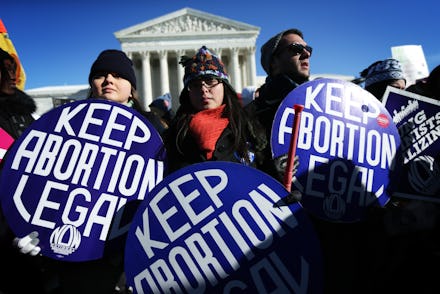42 Years After Roe V. Wade, Here's How Out of Control the Abortion Rate Is In America

It's actually on the decline in a big way.
According to new data from the Centers for Disease Control and Prevention (CDC), the number of abortions in America is at its lowest point since 1973. The agency recorded 730,322 abortions in 2011, which represents a 5% drop since 2010. The CDC also looked at trends in the data between 2002 and 2011, and found that every measure for abortion — total number, rate and ratio — reached their lowest levels in 2011.
On the whole, women in their 20s accounted for 57.8% of abortions in 2011. Women in their 30s, on the other hand, accounted for only 24.7% of the total, while women older than 40 accounted for 3.6% and adolescents 19 or younger accounted for 13.9%.
The numbers are part of a larger trend that began during the 1990s. Although the country saw an uptick in the number of abortions in the decades immediately following the Roe v. Wade Supreme Court decision in 1973, which made the procedure legal, that number started to decline as the 1980s came to a close.
In short? The belief that banning abortion will lead to lower abortion rates is unfounded. Abortion is legal in the majority of jurisdictions in America, and the national abortion rate has continued to nosedive.
Why is this happening? There are a couple of reasons, the first and foremost of which is increased access to contraceptive methods. Unintended pregnancies are one of the primary forces behind abortion, so it follows that preventing them would also lead to a drop in abortions.
"Because unintended pregnancies are rare among women who use the most effective methods of contraception, increasing access to and use of these methods can help further reduce the number of abortions performed in the United States," the CDC noted in its report.
A recent study from the Guttmacher Institute, which aims to advance sexual and reproductive health, echoed these findings. From 2008 to 2011, longterm contraceptive use increased from 4% to 11%, and the report concluded that "fewer unintended pregnancies and abortions may be occurring."
The pregnancy rate has also seen a decline, which supports the ideas behind increased access to contraception: Women aren't carrying children as an alternative to abortion, they're simply not having them in the first place.
"This is consistent with the long-term trends that we've seen," Donna Crane, vice president for policy at NARAL Pro-Choice America, told Mic. "The number of abortions continues to decline, and what we believe we can attribute that to is better contraceptive use."
It may be tempting to argue that a lower abortion rate is the result of more restrictive policies, but it's simply not true. As David Frum at the Atlantic points out, a good deal of abortion restrictions went into effect after 2010. The CDC data showed a decline well before that — as early as 2002, in fact.
But these restrictions are still a big problem. Crane explained that even if we were to achieve a perfect rate of contraception, there's still a need for safe and legal abortion. "Contraception fails, women change their mind, their circumstances change. There's always going to be a need to defend safe and legal abortion," she said.
Planned Parenthood president Cecile Richards echoed this sentiment in an email to Mic. "Every day, [we] work to fight back against attacks on a woman's ability to make her own health care decisions and expanding access to women's health care wherever we can," she wrote. "We know that these basic rights are the foundation of freedom and opportunity for women and their families."
As Bloomberg Businessweek noted in 2013, in the preceding two years alone, 30 states passed 135 laws restricting access to abortion, despite a dearth of evidence that such actions would decrease the abortion rate. Beyond this, there have been multiple cases in which contraceptives, too, have been targeted. The most infamous in recent memory is likely the Hobby Lobby case, which decided that certain companies don't have to cover birth control if there are religious objections.
Crane, however, sees this as a fallacy. "People who oppose legal abortion ... aren't pressing for the most progressive contraception policies," she said. "Why is it our side? We believe it and we're proud of it, but if you feel so strongly that abortion should be illegal, then data like [the CDC's] should cause you to say, we know how to reduce [the rate] and it's clearly better contraceptive rates."
In the end, she summed it up as a desire to control women's bodies — something we've seen time and time again. "This is about wanting to have control over women who want to have sex and not have a child every time they want to have sex," she told Mic.
As the CDC and various other reports have shown, increasing a woman's access to safe abortion won't lead to an meteoric rise in the number of abortions — in fact, the number is actually likely to decrease.
Our policymakers seem not to realize this, but let's hope that data like this can make a difference.